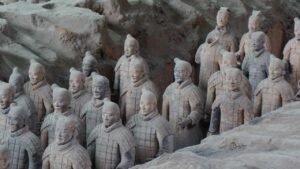Until there is more positive signalling out of Washington, the Australia–China relationship will remain frozen. Neither Morrison nor Albanese has the grace, courage, or diplomatic skills to challenge the status quo.

Two months ago, In my essay ‘How Australia sabotaged its own interests in relations with China’ I reviewed how Australia’s formerly thriving ‘special relationship’ with China had eroded, to Australia’s loss, since around 2015.
I attributed full responsibility to Australia, blaming poor decision-making and clumsy diplomacy towards Beijing by both Turnbull and Morrison governments. I argued that the national security tail had been allowed to wag the national interest dog, sacrificing vital Australian economic interests to US-influenced Sinophobia. Even in Turnbull’s time, the unwise foreign interference legislation and associated media exposure of alleged agents of Chinese influence (reputations ruined and visas cancelled, but nothing ever went to court) had gone down very badly in Beijing.
How Australia sabotaged its own interests in relations with China.
Things have worsened under Morrison: Australian Sinophobe media propaganda went into high gear in support of US Trump administration allegations of persecution of Chinese Muslims in Xinjiang, human rights abuses in Hong Kong, and military provocations in South China Sea – all strenuously rebutted by China.
Worst of all, Morrison through his foreign minister had accused China of exporting Covid to the world. Australia’s mainstream media had taken up the government’s China-baiting with gusto. By December, things looked very bad indeed – possibly beyond repair, at least under the Morrison Government, which stubbornly insisted that Australia was in no way at fault: that the door was open to China to ‘pick up the phone’ and rebuild a relationship based on mutual economic self-interest. This was a profound misreading of how China had valued its previous warm and sincere good relations with Australia.
All of this is by now a familiar critique, at least to P and I readers. Where I went further – and some readers were prepared to entertain the idea – was to suggest the collapse in the relationship was not entirely due to Australian ineptitude and lurking Sinophobia, but may have been quietly encouraged by Australia’s senior Five Eyes partners US and Britain, keen to ensure that their loyal lackey stayed firmly in the Five Eyes strategic laager as US and UK relations with China soured under Trump and Johnson – whatever the cost to Australia.
Sadly, revisiting that essay, in my view nothing important has changed in the past two months. Let’s review what has changed, and what hasn’t.
The most important factor governing Australian attitudes is Washington under the new President Joe Biden. The anti-China hardliners still seem to have the upper hand, judging by harsh words from Secretary of State Blinken, who, after talking to China’s top foreign policy official Yang Jiechi on 6 February, tweeted:
‘I made clear the US will defend our national interests, stand up for our democratic values, and hold Beijing accountable for its abuses of the international system’.
The signaling from Biden is equally hard. As far back as 26 November, Xi sent to Biden a message of congratulations.
Chinese state media reported that Xi messaged Biden that he hoped the two countries would ‘uphold the spirit of non-conflict, non-confrontation, mutual respect and win-win cooperation, [to] focus on cooperation, manage differences, advance the healthy and stable development of China-US ties, and join hands with other countries and the international community to promote the noble cause of world peace and development’.
Biden’s response as President was cool, to say the least. In an interview with CBS on 8 February, he said he ‘had not yet had occasion to talk to Xi’ (remarkably, some 10 weeks after Xi’s announced warm message to him). He said Xi was very tough, very bright, but no democrat. Biden said that unlike Trump, he would ‘focus on international rules of the road’ in dealing with China. He said the countries need not be in conflict, but ‘there’s going to be extreme competition’.
None of this sounds as if any US-China détente is in prospect any time soon. Tensions remain high over Taiwan, whipped up by Western media speculation on increased possibilities for armed conflict there.
Australian Sinophobes in and around the Morrison government take comfort from the continuing coldness in Washington towards China. And Australian Labor, ever fearful of being wedged if it deviates from fervent pro-Americanism, is staying in line behind Morrison’s barely hidden disdain for the Chinese government (see below).
Until there is more positive signalling out of Washington, and it is hard to say when or if this may take place, the Australia–China relationship will remain frozen. Neither Morrison nor Albanese has the grace, courage, or diplomatic skills to challenge the status quo. Nor will Payne, Tehan or Wong step out of line. Both parties continue to be sanctimonious on Hong Kong, Xinjiang, and the South China Sea. There is no sign that either party comprehends the disinformation and regime disruption objectives that support and sustain these Anglo-American narratives, strongly propagandised in the New York Times, Washington Post and The Economist.
Morrison’s latest comments at the National Press Club on 1 February reeked of self satisfaction and condescension towards China: essentially his message was ‘Let us teach you Chinese how the world works.’
He said his government remained committed to its relationship with China although it had different economic and political systems. He said:
‘An enduring partnership requires both of us to adapt to new realities and talk to each other and that begins with dialogue at both ministerial and leader level … A dialogue focused not on concessions but on areas of mutual benefit committed to finding a way for our nations and peoples to beneficially engage into the future.’
The man has no idea – or perhaps he does – how these words and his self-satisfied tone would have simply rubbed more salt in China’s wounds.
Morrison reacted sharply to friendly advice from the New Zealand Trade Minister Damien O’Connor on 28 January, who said that Australia might do better if it showed more respect towards China. O’Connor said New Zealand had a ‘mature’ relationship with China and could raise issues of concern, but added it also respected its trade ties with Beijing.
Morrison’s response on SkyNews on 1 February was uncompromising He rebuked New Zealand: ‘The Five Eyes is really important, and so are liberal market democracies… all of these countries need to align more… on security issues and intelligence’ in opposition to ‘authoritarian’ countries. He added: ‘We’ve got to continue to maintain our vigilance over this, and to do that we’ve got to stick together.’
ASEAN messaging to Australia, especially at think-tank level, warns of the economic decline that awaits us if we go on failing to repair our relations with Beijing.
For example, Singaporean elder statesman and former head of the Foreign Ministry Kishore Mahbubani commented pointedly in the Australian Financial Review on 5 February: ‘Now Australia has dug itself into a hole. All of Asia is watching intently to see who will blink in the current Australia-China stand-off.’
One swallow does not make a summer, but Justice Steven Rares’ award on 2 February of $590,000 defamation damages to prominent Chinese-Australian businessman and philanthropist Chau Chak Wing against the ABC and Channel Nine for falsely alleging he was an agent of Chinese influence will have been quietly welcomed in Beijing. Gossip has it that the ABC and Channel Nine relied on leaked advice from ASIO and ASPI. They may be less inclined to trust such sources in future, and mainstream media hysteria against China seems to be abating a little.
But Chinese Australians continue to worry with good cause about a new spirit of McCarthyism in Australia, and trade and investment and higher education links continue to languish. I wish I had better news to impart, but I don’t.




